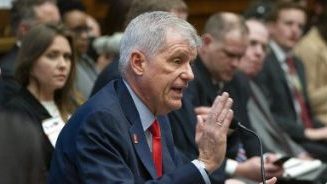Wells Fargo has become a better bank through its efforts to improve its operations, leadership and culture, Tim Sloan, CEO and president of Wells Fargo, told the House Committee on Financial Services.
Also, he outlined the company’s efforts to compensate customers for past issues and on how the bank is working to become the most customer-focused, efficient and innovative company it possibly can be.
“Above all, Wells Fargo is committed to making things right for our customers and earning back the public’s trust,” said Sloan in his testimony. “Wells Fargo is a better bank than it was three years ago, and we are working every day to become better still. This is an ongoing commitment by all 260,000 team members--starting with me--to put our customers’ needs first; to act with honesty, integrity and accountability.”
[adbutler zone_id="326324"]
[adbutler zone_id="326327"]
Wells Fargo is making things right with customers who were harmed, how the company continues to strengthen risk management and controls, and how Wells Fargo’s culture has improved since he became CEO in 2016. He also provided updates on new Wells Fargo innovations aimed at providing customers with additional convenience and simplicity and the company’s deepening commitment to communities.
[caption id="attachment_10949" align="alignleft" width="327"] Sloan highlights steps Wells Fargo has taken to strengthen its business practices.[/caption]
Sloan highlights steps Wells Fargo has taken to strengthen its business practices.[/caption]
Sloan told the committee that Wells Fargo is compensating retail bank customers who were impacted by past retail sales practices issues. To date, the company has reviewed 165 million accounts going back 15 years, contacted more than 40 million customers--both individuals and small businesses—through 246 million communications, and provided tens of millions of dollars in compensation to customers.
“We are taking responsibility not only for fees customers should not have been charged, but also for related effects such as impact on credit scores,” said Sloan. “Our guiding principle has been to err on the side of our customers, and we are taking an over-inclusive approach in doing so.”
Wells Fargo has centralized companywide control functions such as risk, finance, human resources, compliance and technology for better oversight. Within risk, the company has three “lines of defense”--front-line risk, independent risk management, and audit--to ensure multiple layers of review and to improve internal oversight.
It has also hired more than 3,000 new risk team members from outside the company since 2016 with plans to hire more, said Sloan. As a result, Wells Fargo has better visibility into issues as they emerge and can respond to them more quickly.
Since 2016, Wells Fargo’s culture has undergone substantial transformation, Sloan said. It has introduced a clear set of behavioral expectations for team members and enhanced accountability through a single leadership objective that is part of every team member’s annual performance plan.
In 2018, Wells Fargo increased minimum base pay in the U.S. to the current minimum of $15 per hour. The company also granted restricted stock rights to around 250,000 team members and increased the total number of paid holidays from eight to 12--two additional national holidays plus two personal holidays that team members can use for any reason.
In addition, Wells Fargo enhanced its independent Ethics Line to make it easier for team members to report concerns and expanded a program that encourages team members to speak up when they see something that may need additional review, attention or expertise.
Wells Fargo has deepened its already strong commitment to good corporate citizenship, said Sloan. The company has consistently ranked among the leading corporate philanthropists in the U.S. For example, since Wells Fargo began its NeighborhoodLIFT program in 2012, the company has provided more than $442 million in down-payment grants to more than 20,000 families in almost 70 communities across the U.S.
In 2018, Wells Fargo expanded its philanthropic giving by more than 50 percent, donating more than $444 million to nearly 11,000 nonprofits nationwide. Beginning in 2019, Wells Fargo is targeting two percent of after-tax profits for corporate philanthropy.










